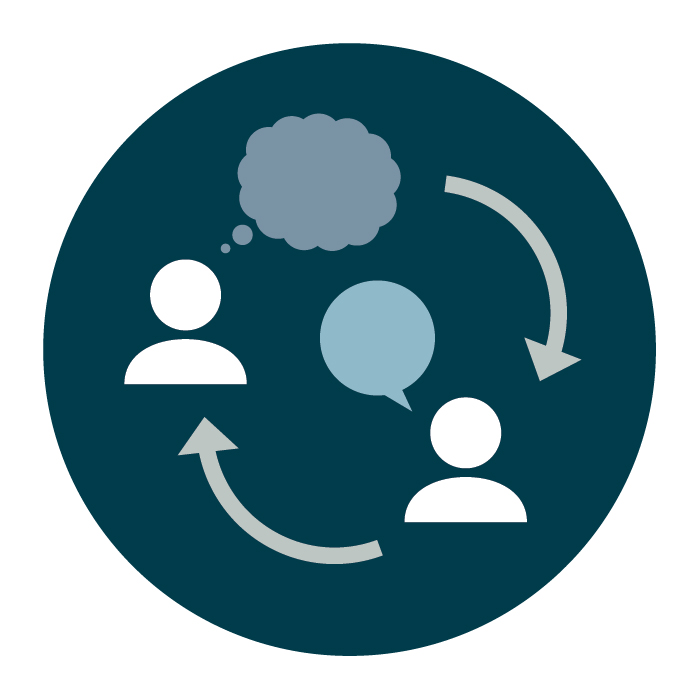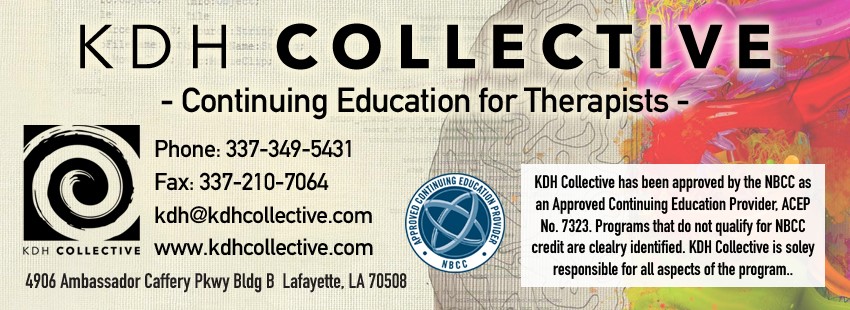Earn Continuing Education
Continuing education is an integral part of professional practice. There are many ways you can earn continuing education credit. Any of the following activities will qualify for continuing education clock hours to recertify your NCC, as long as the activity relates to an approved content area.
For any continuing education activity, you must have proper documentation, as described below, in order to claim credit. You can use the NBCC continuing education credit verification form for activities that do not provide a certificate of completion.

College or University Courses (No clock hour limit)
All courses must be graduate level. Courses may be audited. A transcript, grade report or verification form is required for documentation.
1 semester hour = 15 clock hours
1 quarter hour = 10 clock hours

Seminar, Workshop or Conference Courses (No clock hour limit)
NBCC ACEP approval is not required; however, the courses must meet NBCC guidelines for continuing education. A certificate, verification form or letter verifying attendance is required for documentation. The documentation must include your name, date attended, hours completed, program title and signature of presenter/provider.

Home Study Continuing Education (No clock hour limit)
Any amount of your continuing education clock hours can come from home study programs, including online activities. The same standards for selecting live programs apply to selecting home study programs. That is, they do not have to be NBCC ACEP approved, but they must meet NBCC guidelines for continuing education. A certificate, verification form or letter verifying attendance is required for documentation. The documentation must include your name, date attended, hours completed, program title and signature of presenter/provider.

Publication/Presentations/New Program Development (Limit of 20 clock hours)
Publication activities are limited to articles in refereed journals, a chapter in an edited book or a published book. Required documentation for publication credit is a copy of the cover page of the article or book. For a chapter in an edited book, include a copy of the table of contents.
Presentations and New Program Development include a new course, seminar, workshop, community program, or presentation developed within your current certification cycle.
- New course development is one that you developed. A course with an existing curriculum that you are teaching for the first time does not meet the requirements for continuing education. Courses may be graduate or undergraduate but must be at institutionally accredited colleges or universities. Documentation required is a letter from the department chair verifying your participation in the development of the course.
- New school, hospital or agency in-service programs, hospital mental health team designs, or extensive community outreach systems may also be submitted. All such programs must include documents, dated proposals and supporting materials. Documentation for presentations must include a copy of the program brochure listing you as the presenter and a print out of the presentation.

Dissertation (Limit of 45 clock hours)
List the dates for which credit was granted by your college or university for work done toward the completion of your dissertation. List the title of your dissertation and the name of your college or university. A transcript, grade report or verification form is required for documentation.

Supervision/Consultation (Limit of 25 clock hours)
Continuing education clock hours can only be granted for formal consultation/supervision with a clinical focus received on a regular basis. Credit cannot be granted for supervision you provide to others. List the start and end dates and the site where you received supervision, as well as the name and credentials of your supervisor. A signed letter from your supervisor is required for documentation. Supervision for academic credit should be listed under coursework. A maximum of 25 contact hours can be granted in a certification cycle for supervision taken for academic credit. This supervision must appear on your transcript or grade report.

Leadership (Limit of 20 clock hours)
To qualify for continuing education credit, you must hold a leadership position for a minimum of one year and be within your current certification cycle. The position must be in a state or national counseling organization or state counseling licensure/certification board and must be unpaid. List the position, the start and end dates, and the name of the organization. A signed letter from the organization with the dates and type of service is the required documentation.
Volunteer (Limit of 10 hours)
Volunteer hours may be earned from a national, state, or humanitarian organization. The mission of the organization must fit into an approved content area. A certificate, verification form, or letter verifying attendance and a written statement explaining how the activity assists in your direct service to clients is required for documentation. The documentation must include your name, date attended, hours completed, title of the activity, and signature of a presenter/provider. Activities are considered on a case-by-case basis.

Unrelated Programs (Limit of 20 hours)
Clock hours earned for activities on topic areas that do not fit within NBCC’s nine counseling topic areas may be considered if the activity helps in your direct service to clients. A certificate, verification form, or letter verifying attendance and a written statement explaining how the activity assists in your direct service to clients is required for documentation. Programs are considered on a case-by-case basis.
Recertification/Reinstatement by Examination
A passing score on the NCE or NCMHCE may be used in lieu of the required continuing education hours in the recertification and reinstatement processes.
Calendar of Events
Remember to check the calendar of events for upcoming NBCC-approved continuing education events in your state.
It is not required that your continuing education clock hours come from NBCC Approved Continuing Education Providers; however, your activities must fall within at least one of these approved content areas.
Counseling Theory/Practice and the Counseling Relationship
Continuing education programs in this content area provide an advanced understanding of the counseling processes.
Examples
Foundational and well-established counseling theories, principles and techniques and their application in mental health settings; diagnosis and treatment of mental disorders; wellness and prevention within counseling and treatment; crisis intervention techniques for counselors to use in response to disaster or other rapid-onset trauma-causing events, including psychological first aid strategies; psychophysiological awareness and mindfulness in the counseling process; distance counseling; and biofeedback used in a mental health setting.
Human Growth and Development
Continuing education programs in this content area provide an advanced understanding of the nature and needs of individuals at developmental levels and are relevant to professional counselors and the counseling profession.
Examples
Foundational and well-established theories, including personality theory, life span theory, learning theory and human development theory; end-of-life issues within the scope of practice of mental health professionals; and information related to developmental crises, disabilities, and situational, transitional and environmental factors that affect behavior.
Social and Cultural Foundations
Continuing education programs in this content area provide an understanding of the issues and trends in a multicultural and diverse society that impact professional counselors and the counseling profession.
Examples
Multicultural competency as a professional counselor; societal subgroups; societal changes and trends; mores and interaction patterns; major societal concerns; social justice; and cross-cultural effects, such as acculturation, assimilation and multicultural and pluralistic trends.
Group Dynamics and Counseling
Continuing education programs in this content area provide an advanced understanding of therapeutic group development, dynamics and counseling theories and group counseling methods and skills.
Examples
Group counseling theories and group counseling leadership styles, developmental stages in group counseling and related principles of group dynamics, group counseling methods and skills, and group members’ roles and behaviors within a mental health setting.
Career Development and Counseling
Continuing education programs in this content area provide an advanced understanding of career counseling, development and related life factors.
Examples
Theories, principles and techniques of counseling as applied to work and career; career counseling processes and resources, including those applicable to specific communities and populations; career/life planning and decision-making models; life-work role transitions, including outplacement and retirement counseling; career development program planning, resources and program evaluation; assessment of workplace environment for purposes of job placement; trends in job search; and career avocational, educational, occupational and labor market information, and resources and career information systems.
Assessment
Continuing education programs in this content area provide an advanced understanding of approaches to assessment and evaluation in counseling practice.
Examples
Diagnostic interviewing; clinical assessment and interpretation for use in treatment planning; ethical strategies for selecting, administering and interpreting assessment and evaluation instruments; information on the current edition of the Diagnostic and Statistical Manual of Mental Disorders (DSM); implementation and interpretation of standardized assessment instrument protocols; new and existing assessments; issues related to assessment development; legal issues related to counselor authority to administer and interpret tests and inventories that assess psychopathology, abilities, interests and career options; and information on basic classification, indication and contraindications of commonly prescribed psychopharmacological medications, in order to make appropriate referrals for medication evaluations and to identify the side effects of medication.
Research and Program Evaluation
Continuing education programs in this content area provide an advanced understanding of research methods, statistical analysis, needs assessment and evaluation, and ethical and legal considerations in research.
Examples
Critical evaluation of research findings and its clinical implications, development of measurable outcomes for counseling interventions, foundational and well-established research design and methods, statistics in research, research report development and information on disseminating research findings, and critical evaluation of research findings.
Counselor Professional Identity and Practice Issues
Continuing education programs in this content area provide an understanding of various aspects of professional functioning as graduate-level counselors.
Examples
National Board for Certified Counselors (NBCC) or American Counseling Association (ACA) ethical codes and conduct standards in professional counseling and/or counseling research; ethical decision-making models directly related to counseling practice; NBCC certification, state licensure and related mental health public policy; professional counseling organizations and associations, limited to NBCC, the Council for Accreditation of Counseling & Related Educational Programs (CACREP), and ACA and its branches and divisions; roles and processes related to counselor advocacy on behalf of the profession and the client; the counselor’s role and function as a member of an interdisciplinary team; starting and maintaining a counseling practice, including business-planning, quality control, service delivery, billing and reimbursement, fee-setting, capacity-building, referrals and ethical marketing; effective and ethical utilization of social media; counselor self-assessment to address areas for ongoing professional growth; critical analysis of emerging issues in the counseling profession; clinical supervision models, practices and processes for professional counselors; the counselor’s role and function as a professional consultant; the counselor’s role and function as a forensic interviewer; legal issues in professional counseling and/or counseling research; self-care strategies and burnout prevention appropriate to the counselor role; and grant writing for counselors and counseling programs.
Wellness and Prevention
Continuing education programs in this content area provide psychoeducational information for counselors to enhance their ability to promote optimal wellness related to client mental health.
Examples
Complementary and alternative medicine (CAM), community-based wellness initiatives, conflict resolution, sex education, sleep hygiene, nutrition, and anger management.
Unrelated Programs
Clock hours earned for activities on topic areas that do not fit within NBCC's nine counseling topic areas may be considered if the activity helps in your direct service to clients. A certificate, verification form, or letter verifying attendance and a written statement explaining how the activity assists in your direct service to clients is required for documentation.
Examples
Programs are considered on a case-by-case basis.
ACEP Directory
NCCs have immediate access to NBCC Approved Continuing Education Providers (ACEPs) and continuing education programs via the ACEP Directory. When registering for a course offered by an ACEP, you know that the CE provider has been vetted and that their programs offering NBCC credit will meet your NCC recertification requirements.
CE Provider Complaints
To report a complaint, issue, or concern about an Approved Continuing Education Provider (ACEP) or an approved Single Program Provider to NBCC, please complete this complaint form.
CE Calendar of Events
Remember to check the calendar of events for upcoming NBCC-approved continuing education events in your state.
